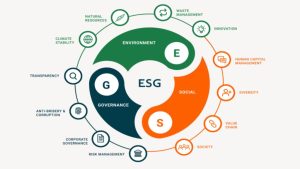In today’s global marketplace, businesses are increasingly evaluated not only by their profitability but also by their impacts on people and the planet. This shift has made ESG—Environmental, Social, and Governance—a central framework for companies aiming to demonstrate responsibility and long-term sustainability. Understanding ESG is crucial for modern businesses seeking to manage risks, create value, and build positive reputations. This article explores the fundamental concepts of ESG and provides insights on how companies can effectively integrate these principles.
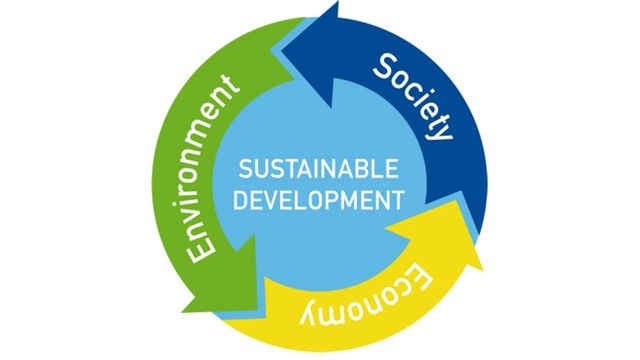
What is ESG?
ESG stands for Environmental, Social, and Governance—three pillars that measure a company’s performance beyond financial metrics.
- Environmental (E): This covers a company’s interaction with the natural world. It includes carbon emissions, energy usage, waste management, and the impact on biodiversity.
- Social (S): This aspect looks at how a company manages relationships with its employees, suppliers, customers, and the communities it operates in. Issues like diversity, labor practices, and human rights fall under this category.
- Governance (G): Governance refers to how a company is run—its leadership, transparency, ethics, and accountability. It covers issues like executive pay, shareholder rights, and compliance with laws and regulations.

Why ESG is Important
ESG is no longer a secondary consideration for businesses. It has become a crucial framework that impacts a company’s operations, reputation, and bottom line.
Key Benefits of ESG
- Risk Management: ESG helps companies identify and mitigate risks related to environmental impacts, labor practices, and corporate governance. For instance, failure to address environmental issues can lead to regulatory penalties and operational disruptions, while poor labor practices can result in reputational damage.
- Operational Efficiency: Companies that implement energy-efficient technologies or reduce waste often realize cost savings. For example, optimizing supply chains for sustainability reduces not only environmental impact but also operational costs.
- Attracting Investors: With increasing awareness of social and environmental concerns, investors are prioritizing ESG when making decisions. Companies with strong ESG practices attract investment from stakeholders looking to balance financial returns with positive societal outcomes.
- Customer Loyalty: Consumers are growing more aware of the values businesses stand for. Companies that focus on sustainability and ethical practices often build stronger, more loyal customer bases.
Environmental Responsibility: More Than Just Planting Trees
When people think of environmental sustainability, they often think of actions like tree planting or recycling. However, the environmental pillar of ESG goes far beyond that. Companies are expected to address their entire environmental footprint, from energy use to supply chain impacts.
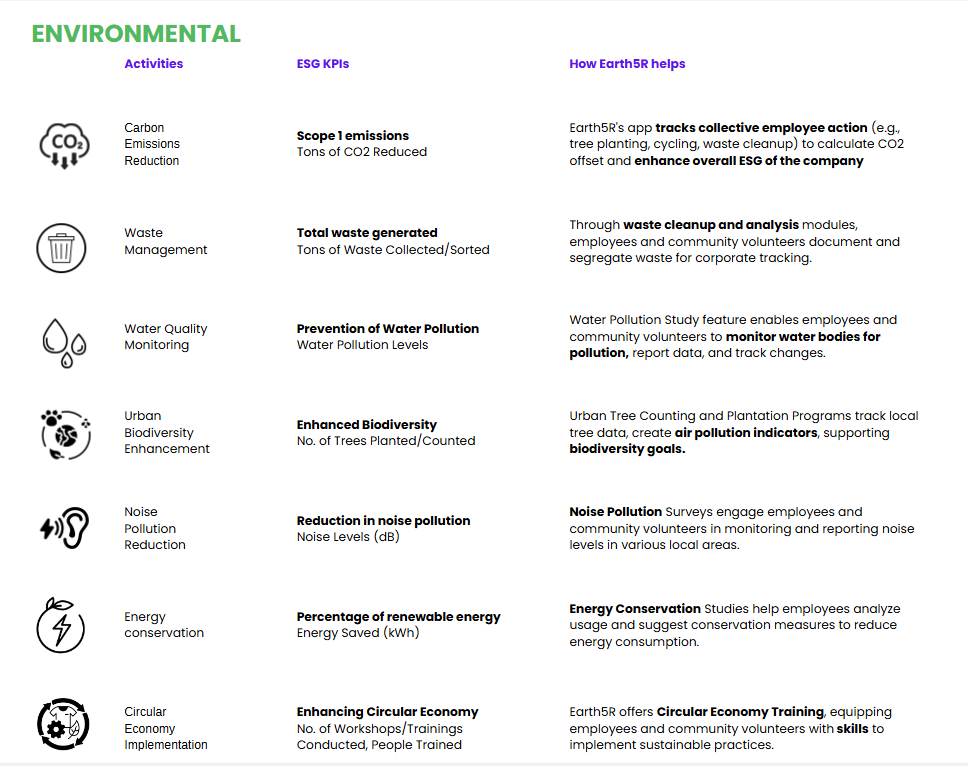
- Carbon Emissions and Scope
One of the key metrics in environmental responsibility is carbon emissions, measured across three scopes:
- Scope 1: Direct emissions from owned or controlled sources, such as company vehicles or production plants.
- Scope 2: Indirect emissions from the generation of purchased electricity, steam, or cooling systems.
- Scope 3: All other indirect emissions that occur in a company’s value chain, including those produced by suppliers and end users.
An example of environmental responsibility is Earth5R’s work with businesses to reduce their Scope 3 emissions. Through its app and platform, Earth5R helps companies track and manage their emissions across supply chains, ensuring that environmental targets are met.
- Biodiversity and Resource Management
Another crucial aspect is biodiversity. Businesses must be mindful of their impact on ecosystems, especially in sectors like agriculture and manufacturing. Companies that fail to preserve biodiversity in their operational areas face legal challenges and reputational damage.
For instance, a manufacturing company operating near a protected forest needs to consider the effect its operations have on local flora and fauna, and take action to minimize harm, such as through sustainable sourcing or waste management practices.
Social Responsibility: Moving Beyond Compliance
The social pillar of ESG is about managing relationships with people—employees, customers, suppliers, and the broader community. While environmental factors are often easier to measure, social responsibility presents its own unique challenges.

- Diversity and Inclusion
Diversity and inclusion are central to social responsibility. Companies are expected to create work environments that embrace diversity—not just in terms of gender, but also race, sexual orientation, and socio-economic background. For instance, companies in India are increasingly focusing on hiring from LGBTQ+ communities and providing opportunities for persons with disabilities.
- Employee Health and Safety
Employee health and safety is particularly critical in high-risk industries like manufacturing and chemicals. Ensuring safe working conditions, as well as mental health support, are vital components of a socially responsible organization.
Earth5R’s community-driven programs provide practical examples of how businesses can enhance their social responsibility. By working with local communities to improve environmental awareness and involve residents in sustainability projects, Earth5R creates shared value between businesses and their social surroundings.
- Supply Chain Accountability
A company’s responsibility does not end with its direct operations. The ethical treatment of workers across the supply chain is a key issue in ESG. Global brands have faced backlash for sourcing from factories with poor labor conditions, often leading to public outrage and boycotts.
Fast fashion brands, for instance, have been scrutinized for their suppliers’ labor practices, highlighting the importance of transparency in sourcing and production. Businesses are now expected to ensure that their suppliers uphold human rights and ethical labor standards.
Governance: The Foundation of ESG
Governance is the backbone that supports a company’s environmental and social efforts. Without strong governance, even the best-intentioned ESG initiatives can falter.

- Diversity and Leadership
A well-governed company starts with a diverse and competent board of directors. Diverse boards bring varied perspectives, helping to guide ethical decision-making and long-term strategic planning. Companies are also expected to maintain transparency regarding executive pay and compensation structures.
- Transparency and Accountability
Governance also involves transparency in business operations. Investors and the public are increasingly demanding access to information about how companies are managed. For instance, businesses are expected to disclose not just their financial results, but also their non-financial performance metrics, such as employee diversity, ethical sourcing, and environmental impacts.
In a governance failure case, Tesla was removed from the S&P 500 ESG Index due to concerns over governance and labor issues, despite its strong environmental credentials. This underscores how critical it is for companies to balance all aspects of ESG, not just the environmental pillar.
Challenges of ESG: Greenwashing and Superficial Efforts
Despite its importance, ESG is not without challenges. One of the most significant risks is greenwashing, where companies overstate or misrepresent their sustainability efforts. Greenwashing undermines the credibility of genuine ESG efforts and breeds skepticism among consumers and investors.
The Starbucks Example:
For example, while Starbucks publicly committed to halving its carbon footprint by 2030, its CEO faced criticism for choosing to commute via private jet, a practice that is 5 to 14 times more polluting per passenger than commercial flights. This highlights the discrepancy between corporate promises and actual practices, leading to a loss of trust.
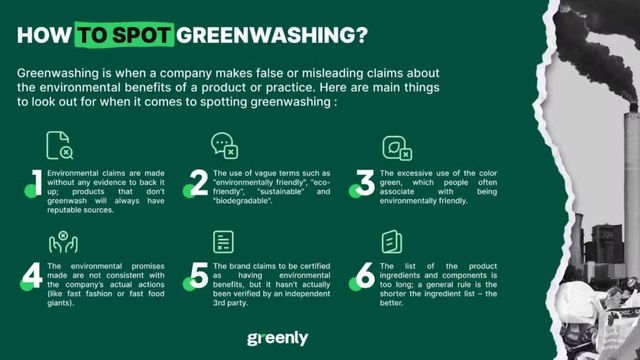
ESG as a Marketing Tool:
Some companies use ESG as little more than a marketing tactic, positioning themselves as sustainable without making meaningful changes. This risks turning ESG into a branding exercise rather than a framework for genuine improvement.
Additionally, there is concern that some businesses use ESG to justify premium pricing, capitalizing on consumers’ willingness to pay more for “sustainable” products without providing enough transparency or real benefits.
The Future of ESG
The future of ESG will require businesses to go beyond superficial commitments. Companies must integrate ESG into their core strategies, focusing on transparency, long-term sustainability, and continuous improvement.
Community-Driven ESG
Organizations like Earth5R provide a model for community-driven ESG initiatives. By involving local communities in sustainability projects, Earth5R ensures that ESG efforts benefit both businesses and society. Such initiatives demonstrate the power of collective action, where businesses, governments, and citizens work together toward shared sustainability goals.
For Indian companies, integrating ESG is no longer just about compliance; it has become a strategic imperative. Leading organizations worldwide are prioritizing sustainable practices, which are now essential to attract investors, retain customers, and stay competitive. Earth5R facilitates this journey by offering tools and platforms to track, report, and improve ESG performance, ensuring that companies can measure and communicate their impact effectively.
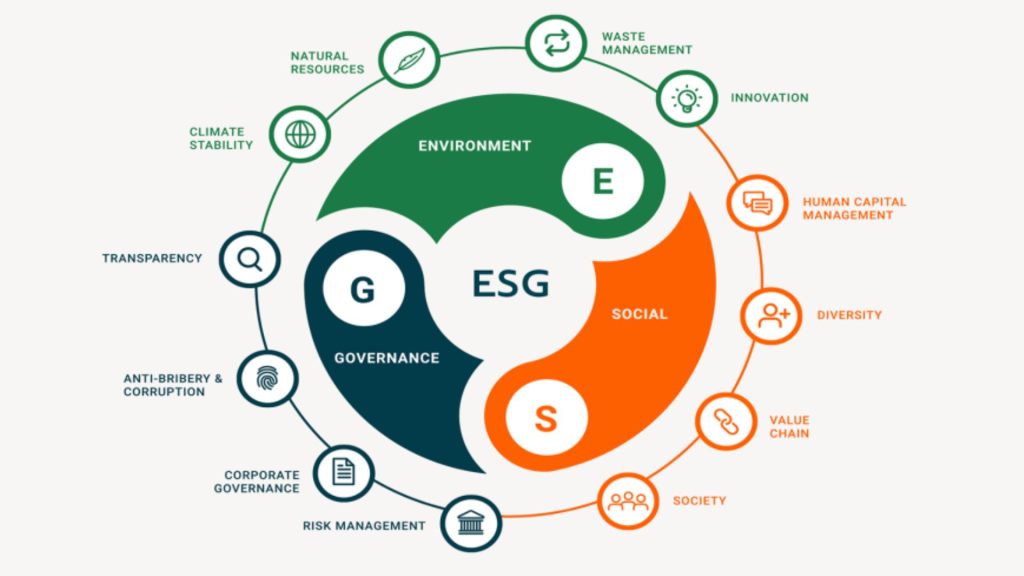
Challenges and Barriers to ESG Adoption in India
While the benefits of ESG are clear, the path to full integration is not without challenges, especially for Indian businesses:
1. Cost and Resource Limitations
One of the most significant challenges Indian companies face is the perceived cost of transitioning to sustainable practices. Whether it’s adopting renewable energy, upgrading to electric vehicles, or redesigning supply chains, the initial capital expenditure can seem prohibitive. However, Earth5R emphasizes that the long-term benefits of ESG far outweigh these short-term costs. Companies that invest in sustainability today will gain a competitive edge, reduce risks, and future-proof their operations.
2. Cultural and Organizational Mindsets
Many businesses in India operate with a top-down decision-making model, where innovation is often stifled. For ESG to take root, companies must foster a culture of innovation and openness to change. This includes promoting cross-functional collaboration and encouraging employees at all levels to contribute to sustainability goals. The top leadership must demonstrate their commitment by embedding ESG into the company’s core values and long-term strategy.
3. Lack of ESG Expertise
Another major barrier is the limited understanding of ESG concepts within organizations. Many businesses lack the necessary knowledge or expertise to implement and track their sustainability initiatives. Earth5R addresses this by providing training, consultation, and digital tools that help companies navigate the complexities of ESG compliance, ensuring that their strategies are both effective and measurable.
Opportunities Through ESG: A Catalyst for Growth and Innovation
Despite the challenges, ESG presents numerous growth opportunities for Indian companies, especially those willing to take the lead in sustainability.
1. Access to Global Markets
As sustainability becomes a global priority, companies with strong ESG practices can access international markets more easily. European and North American investors, for example, are increasingly focusing on companies that prioritize sustainability. Indian businesses that align with ESG standards can attract international investments and tap into new customer segments that value ethical and environmentally conscious products.
2. Innovation in Clean Technology and Renewable Energy
ESG adoption pushes companies to innovate, especially in sectors like clean technology, renewable energy, and electric vehicles. Take, for example, the auto industry’s shift toward electrification. Leading companies like Tata Motors have invested heavily in electric vehicle (EV) development, reaping significant rewards as the market increasingly shifts away from internal combustion engines. Earth5R supports companies in this transition by connecting them with decarbonization projects and helping track progress towards net-zero goals.
3. Sustainability as a Competitive Advantage
Indian companies that successfully integrate ESG into their operations can gain a significant competitive edge. Not only do they enhance their brand reputation, but they also build stronger relationships with stakeholders, from employees to customers and investors. Companies with robust ESG practices are also better equipped to manage risks related to climate change, regulatory pressures, and shifting consumer preferences.
Realizing ESG’s Full Potential with Digital Tools
To truly capitalize on the ESG opportunity, Indian companies must embrace technology to track, measure, and optimize their impact. This is where Earth5R‘s digital platform stands out. Through an AI-enabled app and SaaS-based dashboard, Earth5R empowers companies to:
- Track sustainability KPIs in real-time, offering insights into areas like carbon emissions, water usage, and energy efficiency.
- Measure on-ground impact through its community engagement platform, ensuring that both local and global sustainability efforts are data-driven and result-oriented.
- Enable data-backed decision-making, helping businesses identify where they can reduce costs, improve efficiency, and mitigate risks associated with climate change.

This tech-first approach ensures that ESG is not just a theoretical framework but an actionable strategy that delivers tangible results. By leveraging data and AI, Earth5R helps businesses of all sizes—from SMEs to large corporations—create meaningful environmental and social impact while meeting their compliance requirements.
The Role of ESG Committees in Governance and Implementation
A critical element of ESG integration is governance. Companies that take ESG seriously are increasingly establishing dedicated ESG committees at the board level. These committees are responsible for setting the tone at the top, ensuring that sustainability is not an afterthought but a core part of business strategy.
Leading companies such as Infosys and Tata Steel have adopted this model, creating a strong foundation for sustainable governance. These companies have also expanded their Corporate Social Responsibility (CSR) committees to include sustainability oversight, ensuring that ESG principles are embedded in both internal operations and external community initiatives.
Overcoming Financing Barriers Through Global Cooperation
Financing remains a significant challenge for companies transitioning to ESG. The costs of adopting cleaner technologies, retrofitting facilities, or transitioning to renewable energy are considerable. This is where Earth5R advocates for stronger global collaboration. India has already made a compelling case at international forums like COP26, arguing for greater flexibility and financing options for developing countries. By working with international organizations and financial institutions, Indian companies can access green finance and other support mechanisms that ease the financial burden of transitioning to sustainable practices.
Earth5R and the Future of Sustainability in Indian Business
The path to sustainability is clear- companies that fail to adopt ESG will increasingly be left behind, while those that act now will thrive in a future where environmental and social responsibility is paramount. Earth5R is at the forefront of this transformation, providing businesses with the tools, technology, and expertise they need to succeed in the green economy.
By integrating ESG into their core strategy, Indian companies can unlock new markets, innovate with sustainable solutions, and create long-lasting value for all stakeholders. The future of Indian business is not just about profitability—it’s about creating a resilient, responsible, and sustainable model that drives growth while protecting the planet and its people. The time for action is now, and Earth5R is leading the way.


